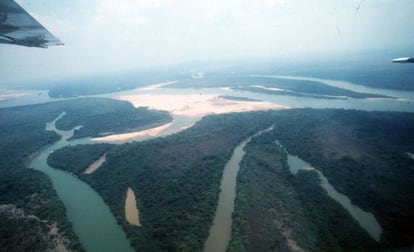Deforestation in Brazil increases for the first time in a decade
The government’s policing of large segments of forestland is not enough

Brazil seemed to be taking the right course to reduce deforestation in the Amazon. In 2004, deforestation affected 27,772 square kilometers, but that number went down to 4,571 square kilometers in 2012 thanks to the government’s efforts against illegal practices. But according to records from the non-profit Amazon Institute of People and the Environment (Imazon), deforestation increased in 2013, affecting 5,891 square kilometers.
Between August and September 2014, illegal clearing of forestland destroyed 838 square kilometers, a 191-percent increase compared to 2013. Imazon researcher Beto Veríssimo says the numbers are alarming because they may be an indicator of the as-yet-unpublished data for the 2013-2014 period. “I think the last two years will show a shift [in the trend],” he says, given that deforestation had been on the decline for the last decade.
If deforestation increases, we will have a troubling rise of carbon dioxide emissions"
Beto Veríssimo, Imazon researcher
Recent international reports say Brazil has exhausted its plan against deforestation. The United States National Academy of Sciences’ magazine published a study last month recommending changes in handling the problem. According to the text, big companies, which are still the largest contributors to the problem, tried to halt deforestation more than small companies because the government uses satellite surveillance, inspection and punitive measures to protect forest land – initiatives that make it easier to monitor the activities of the largest companies.
Veríssimo says there is a “cocktail of factors” that explain the rise in deforestation: speculation on public forestland, agricultural expansion, and grileiros – individuals who try to seize lands using falsified documents. According to the researcher, the vast territory known as the Legal Amazon – an administrative zone that includes nine states and represents 60 percent of Brazil – makes it difficult to fight against invasion and seizures of forestland. “The government will have to listen to the experts and create tougher oversight measures,” Veríssimo says.
It’s impossible to think of a worldwide initiative to benefit forests without including Brazil. That makes no sense”
World leaders at the United Nations Climate Summit in September 2014 created a document that proposed reducing deforestation by half by 2020. Brazil was left out. According to Environment Minister Izabella Teixeira, the country did not sign the document because it had not been consulted during its preparation. “It’s impossible to think of a worldwide initiative to benefit forests without including Brazil. That makes no sense,” she noted.
In 2009, then-president Lula made the commitment to reduce deforestation in the Amazon by 80 percent and greenhouse gases by 39 percent by 2020. The agreement was signed at the global Climate Change Conference (COP 15) in Denmark. But Veríssimo says it will be hard to keep that pact. “Starting in 2016, according to this agreement, the rate of deforestation will have to be around 3,500 square kilometers. We are at 5,800.”
If the government does not change its policies, the situation could have significant consequences. “If deforestation goes back up, we will have a troubling rise in carbon dioxide emissions,” Veríssimo says. “Brazil will go from being a ‘solution country’ to being ‘a problem country’ very quickly.”
Translation: Dyane Jean François
Tu suscripción se está usando en otro dispositivo
¿Quieres añadir otro usuario a tu suscripción?
Si continúas leyendo en este dispositivo, no se podrá leer en el otro.
FlechaTu suscripción se está usando en otro dispositivo y solo puedes acceder a EL PAÍS desde un dispositivo a la vez.
Si quieres compartir tu cuenta, cambia tu suscripción a la modalidad Premium, así podrás añadir otro usuario. Cada uno accederá con su propia cuenta de email, lo que os permitirá personalizar vuestra experiencia en EL PAÍS.
¿Tienes una suscripción de empresa? Accede aquí para contratar más cuentas.
En el caso de no saber quién está usando tu cuenta, te recomendamos cambiar tu contraseña aquí.
Si decides continuar compartiendo tu cuenta, este mensaje se mostrará en tu dispositivo y en el de la otra persona que está usando tu cuenta de forma indefinida, afectando a tu experiencia de lectura. Puedes consultar aquí los términos y condiciones de la suscripción digital.









































